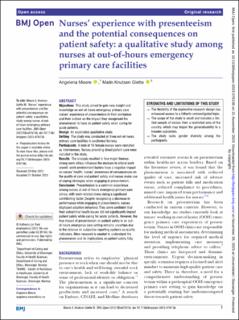| dc.contributor.author | Moore, Angelena Ursula | |
| dc.contributor.author | Glette, Malin Knutsen | |
| dc.date.accessioned | 2023-12-19T07:36:58Z | |
| dc.date.available | 2023-12-19T07:36:58Z | |
| dc.date.created | 2023-11-28T10:52:10Z | |
| dc.date.issued | 2023 | |
| dc.identifier.citation | Moore, A., Glette, M.K. (2023) Nurses´ experience with presenteeism and the potential consequences on patient safety: a qualitative study among nurses at out-of-hours emergency primary care facilities. BMJ Open, 13(11) | en_US |
| dc.identifier.issn | 2044-6055 | |
| dc.identifier.uri | https://hdl.handle.net/11250/3108083 | |
| dc.description.abstract | Abstract
Objectives This study aimed to gain new insight and knowledge on out-of-hours emergency primary care nurses’ experience of presenteeism in their workplace and their outlook on the impact they recognised the phenomenon to have on patient safety when caring for acute patients.
Design An explorative qualitative study.
Setting The study was conducted at three out-of-hours primary care facilities in southwest Norway.
Participants A total of 10 female nurses were recruited as interviewees. Nurses providing direct patient care were included in the study.
Results The analysis resulted in four major themes: strong work ethics influence the decision to attend work unwell; work environment factors have a negative impact on nurses’ health; nurses’ awareness of consequences on the quality of care and patient safety and nurses make use of coping strategies when engaging in presenteeism.
Conclusion Presenteeism is a common experience among nurses at out-of-hours emergency primary care clinics, with work-related stress being a significant contributing factor. Despite recognising a decrease in performance while engaging in presenteeism, nurses displayed adaptive behaviour. They were confident that their suboptimal health issues did not significantly impact patient safety while caring for acute patients. However, the true impact of presenteeism on patient safety in an out-of-hours emergency care setting remains uncertain due to the reliance on subjective reporting systems as quality indicators. More research is needed to understand the phenomenon and its implications on patient safety fully. | en_US |
| dc.language.iso | eng | en_US |
| dc.publisher | BMJ Publishing Group | en_US |
| dc.rights | Attribution-NonCommercial 4.0 Internasjonal | * |
| dc.rights.uri | http://creativecommons.org/licenses/by-nc/4.0/deed.no | * |
| dc.subject | sykepleievitenskap | en_US |
| dc.subject | sykepleiere | en_US |
| dc.title | Nurses´ experience with presenteeism and the potential consequences on patient safety: a qualitative study among nurses at out-of-hours emergency primary care facilities | en_US |
| dc.type | Peer reviewed | en_US |
| dc.type | Journal article | en_US |
| dc.description.version | publishedVersion | en_US |
| dc.rights.holder | © The Author(s) 2023 | en_US |
| dc.subject.nsi | VDP::Medisinske Fag: 700::Helsefag: 800::Sykepleievitenskap: 808 | en_US |
| dc.source.volume | 13 | en_US |
| dc.source.journal | BMJ Open | en_US |
| dc.source.issue | 11 | en_US |
| dc.identifier.doi | 10.1136/bmjopen-2023-076136 | |
| dc.identifier.cristin | 2203551 | |
| cristin.ispublished | true | |
| cristin.fulltext | original | |
| cristin.qualitycode | 1 | |

